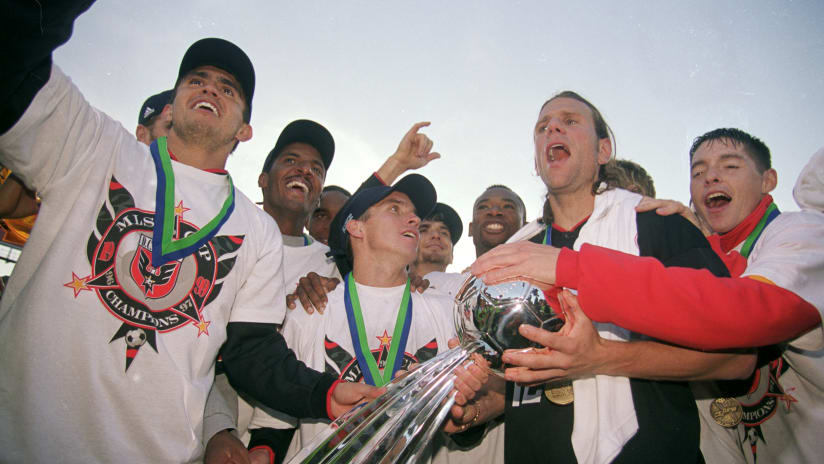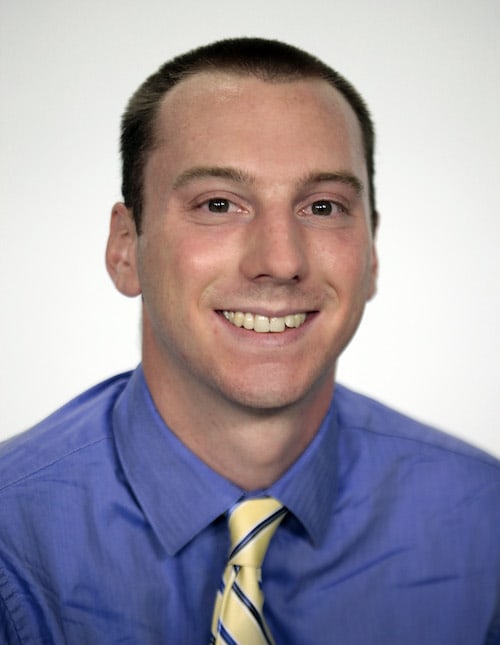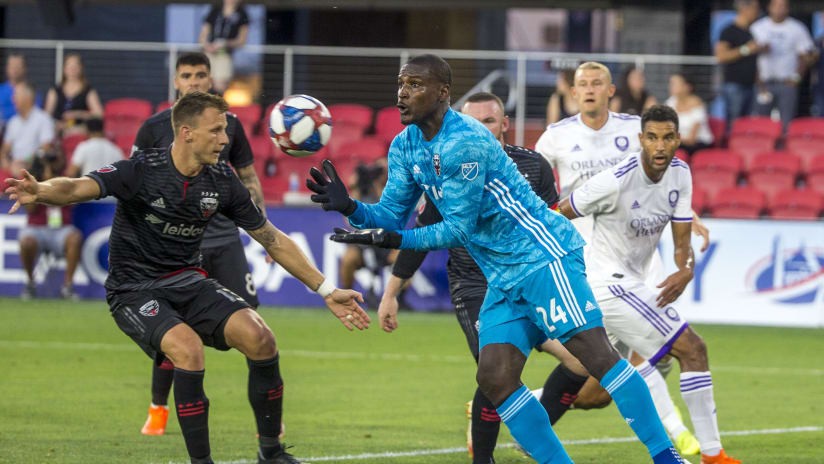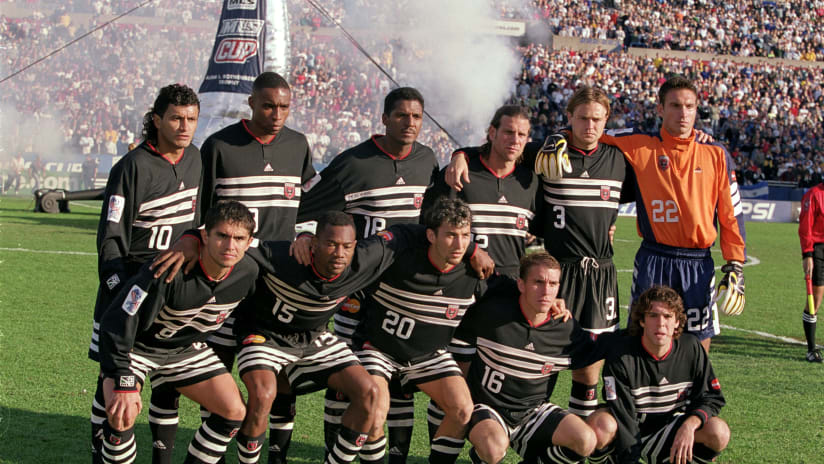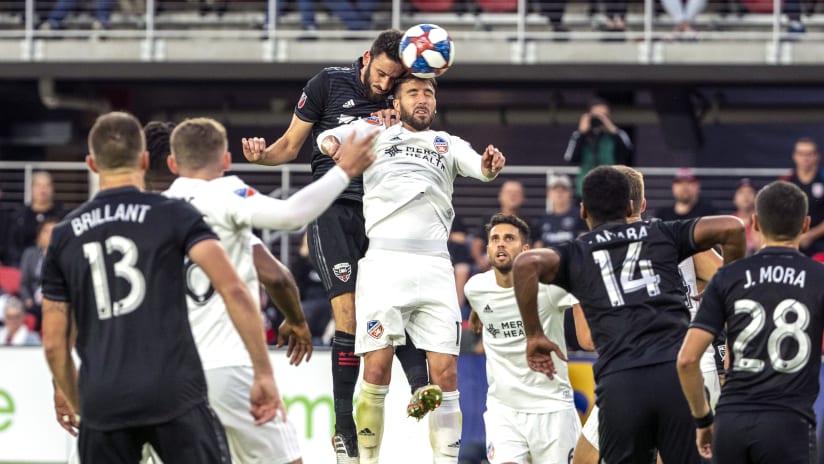Twenty years ago, on Nov. 21, 1999, D.C. United captured its third MLS Cup in four seasons to cement its legacy as the first true dynasty in league history, a claim that would be strengthened when the Black-and-Red captured another title five years later. And on that balmy November afternoon at Foxboro Stadium, before a raucous crowd of nearly 45,000 fans, United bested the LA Galaxy in a 2-0 victory that served as the capstone for a remarkable campaign.
That season, under the direction of first-year coach Thomas Rongen, United posted the best record in MLS (23-9), scored the most goals in MLS (65) and finished with the best defensive performance in franchise history (43 goals conceded). Defender Jeff Agoos, midfielder Marco Etcheverry and forward Jaime Moreno were all named to the MLS Best XI, tied with the Galaxy for the most players from a single team.
Over the next few weeks, we will recreate the ’99 season through the memories of those who lived it: the players, coaches and staff members who exorcised their demons from a crushing defeat in the 1998 MLS Cup to hoist a trophy and parade it through the streets of Washington D.C., rewarding those faithful fans who had stuffed RFK Stadium to its capacity all year.
Our next viewpoint comes from Agoos, who anchored the United defense by starting 29 of the 30 games he played that season. Agoos had been with the club since the league’s inaugural season, in 1996, and would end his career with more than 240 appearances in MLS for three different franchises: D.C. United, the San Jose Earthquakes and the New York/New Jersey MetroStars.
iTunes | Spotify | Stitcher | Google Play | SoundCloud
Q: Going back to the beginning of the season when you report for training camp, obviously you knew the team was a special bunch, but was the goal right away to win MLS Cup?
A: So I’d say ’98 and ’99 were essentially one season for us because of how ’98 ended. So ’99 was really just the extension of trying to sort of undo what happened in the final and got back to MLS Cup and prove and show and provide an example for why we thought we were the best team in the league. With Bruce’s departure earlier in that year, you know, Thomas Rongen was coming on, but outside of that, really everything else was about the same. I think the team was really more on a mission to try to prove that not only should we have won, but we felt like we were the best team in the league for both years.
What was it like to adjust to a new manager and maybe some new styles or philosophies?
Well Thomas is a different type of manager than Bruce (Arena). I give Thomas a lot of credit. What Thomas did really well was sort of — he just got out of the way, and the team really was the one that pushed everything forward. I think a lot of coaches come in and want to put their mark on the team and bring in different players and different styles and a different system, but I think Thomas was really smart enough to understand and see what he inherited and understand that, essentially, he just had to continue paddling the boat forward. And that was really what he did well. I give him a lot of credit for managing a bunch of really unique guys, but also steering that ship forward because it could have gone in different directions.
(Assistant coach) Dave (Sarachan) should probably get as much credit as Thomas because he’s a guy that is just great around people and knows how to push buttons. But he really makes people feel like they’re valued and cared about and he does a lot of the little things that people don’t see behind the scenes, where Thomas may have to be a little bit more straight forward and rough. Dave was really the guy that polished the edges and really the guy that made things tick. And not just with Thomas, but just in general. I can’t say enough good things about who Dave is both as a coach but, more importantly, as a person.
Your name comes up a lot in terms of players who took on a leadership role and kind of cemented themselves at the top of that group. In your own mind, what was your role on that team in addition to playing great defense?
It turned out that it was my penultimate season with D.C. United, and the 2000 season was my last one. But I felt like we had started to morph together as a cohesive unit after starting in 1996, where we had a variation of two completely different teams, but then we were able to build on that and bring in good draft picks. We had Roy Lassiter come in, Roy Wegerle come in, so we were able to continue to build and improve the team with Marco and Jaime and several players just coming in from different places and just improving the overall structure.
My role was fairly easy: I was able to lead some very good players and felt like, you know, just trying to lead by example and lead on the field was going to be important to what we were doing day in and day out on the practice field and on the game field.
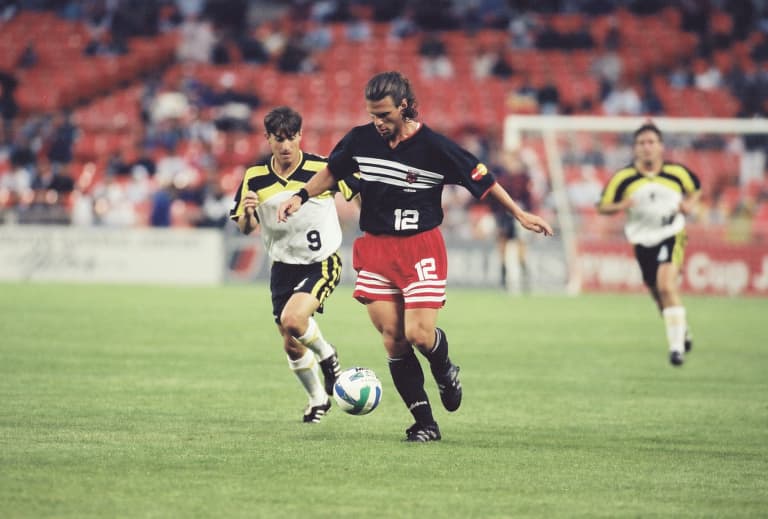
Looking at the stats from the end of the season, you guys finished with the best offense in the league and it was also D.C. United’s best defensive team in franchise history. I know you were aware the team had good talent and the chance to win MLS Cup again, but did you know specifically on both ends of the field that the group was as potent as it turned out to be?
Yeah I think there was a real — we didn’t know going into the ’99 season, but we knew there was something special there. We knew we had a pretty potent offense and we knew we had a very solid defense. Between myself and Eddie (Pope) and Carlos (Llamosa), I think Tom (Presthus) was in goal at that point. So I think we felt really, really secure in the back. I think we felt really solid in the back, and it was just a matter of how many chances are we going to be able to create. This was a season of how can we go out and establish our will on other teams, and how can we go out and manage the game in the way we want to manage it.
I’ve seen highlights and things like that, but I certainly didn’t watch a ton of games back then. I was pretty young at the time. But I look through some of the numbers and I see four guys with 10 or more assists, which isn’t very common anymore. Was ball movement and spreading things out, making sure passes came from everywhere, was that a staple of the team at the time?
Well, I think it became one (of the staples). I don’t think it was one at the beginning. And I think it was derivative of the type of player that we had and we were able to continue to get. Ben (Olsen) came in earlier in ’98. I think it was just a staple of the type of player we were able to bring in. Because it is hard to keep possession, it is hard to try to move the ball around, especially when teams are going to put pressure on you. Once teams understand that when they do pressure you can get through them, then it makes it very hard for them to continue to pressure. I think once we were able to do that consistently, it made it very difficult for our opponents to try to establish a pressure game plan. So essentially, they had to sit back. The difficulty, then, was how could we expose teams who were sitting back behind the ball. There were a lot of different variations of the strategy we had to use throughout the season.
In terms of wins and losses, you guys started out pretty hot with 11 wins in the first 14. So when you get to the one-third mark of the season, was everybody still convinced that this team was as good as it could be?
I think we were very, very narrowly focused on going back to MLS Cup and winning MLS Cup, primarily because we felt like ’98 was probably one of our best teams as well. The fact that we weren’t able to win after a really, really strong year with one really poor performance in the final meant that we had to redeem ourselves, and the only way to do that was to get to MLS Cup. There was no letting off the gas. It was full steam forward and it was do whatever you have to do to get into the playoffs and then move through the playoffs and get to MLS Cup and win it. We had a very strong foundation and a very strong vision of what we thought that season was going to look like.
What did Roy Lassiter bring to the team when he got there in ’98 and then continuing into ’99?
Look, Roy gave us incredible depth in terms of being able to stretch defenses with his speed. And then we were able to play balls over the top that we weren’t (previously playing), so it stretched the other teams’ defenses. Now teams couldn’t really push forward and try to pressure us as much when we could play balls behind. Look, in the end he was one of the best finishers in MLS and held a record up until just a few years ago, which I think says a lot about what he was able to accomplish. And he was a really integral part of our success as we moved into the remaining years of 1998 and 1999.
Off-field continuity is never a guarantee of on-field success, but was there camaraderie or a legitimate sense of friendship among the guys that did translate to the pitch?
Yeah. One of the strongest parts, I think, of our group was being able to stand shoulder to shoulder on the field and really ensure that you had the other guy’s back, and a lot of that came from the off-field stuff. A lot of teams would just come in from 8 or 9 o’clock (in the morning) and leave at 11, 12, 1, 2 p.m. — whatever it was — but we had very good relationships with each other’s families, we had barbeques, we had events for family.
You know, family was a very strong word at our club. Whether you had a family or not, D.C. was the extended family. I think both (club president) Kevin (Payne) and Bruce established that early on. Kevin continued that. But it was a very important part of our ethos in terms of what we were as a team. So that continued and I think that off-the-field type of camaraderie really showed on the field.
You guys went on an 11-game winning streak in August and September. So as you’re getting close to the playoffs and getting close to having that chance to reach your goal again, what do you remember about the environment and mood at the time?
I think there was some level of being anxious, knowing that we had a really good team. I’m not sure that people believed that we could continue to go to MLS Cup again because, you know, in this sport anything can happen. My feeling was quiet concern and anxiousness, but a sense of confidence in terms of what the team had. So as long as we could execute, I felt like it was going to be very hard to stop us.
You get into the playoffs and the first leg was pretty easy. You kind of breezed by Miami in two games. But then you have a pretty difficult series with Columbus. You win the first game 2-1, you lose the second game 5-1. What was the mindset after that second game, where all of a sudden, it’s win or go home in the third game?
I think it was confidence. We knew we weren’t as bad as a 5-1 game. We felt like it was just a one-off type of game. One of the really good things about the team that we had was we could just move on from bad performances. They didn’t impact or affect the next performance. I think that’s sort of attributable to the type of players that we had, the type of people that we had on the team. I don’t think there were a lot of questions going into the third game that a lot of teams would have after being beaten 5-1. Certainly, you know, we wanted to make sure that we moved on and went to the final, and Columbus was a really potent team at that time and they were a really quality team. So we knew it wasn’t just going to be an easy game. But we also knew that if we stepped up and played the game we wanted, we would have a really good chance of moving through to the last round.
So you keep a clean sheet with a 4-0 win in the third game, but then I’m looking at the box score and you get a goal and three assists from Marco, you get two goals from Roy and then a goal and an assist from Jaime. Between the clean sheet and those specific guys stepping up, is that an example of some of the veteran leadership kind of taking it upon themselves in what was essentially the biggest game of the season in that moment?
Yeah. Absolutely. I think it’s a microcosm of what we were trying to establish throughout the season in terms of our important players stepping up. In that game obviously Roy and Marco and Jaime certainly did that, and we needed them to do that. And on the other end, I think the entire team contributed to the clean sheet. That game was sort of just a microcosm of what we had tried to establish throughout that entire year.
There were eight days between that Columbus third leg and MLS Cup. Do you remember what it was like in those training sessions or what the buildup was like?
I think we were more giddy than anything. I think (eight) days felt like it took three months. We wanted to get to the Cup quickly. We felt like we were playing well. There was a lot of anticipation in terms of trying to rectify what happened in 1998. I just think that we were, you know, really looking forward to having the referee blow the whistle and getting into the game.
What did you think of the LA Galaxy? What did you know about them? How familiar were you with them as a team?
LA is always a quality team, and we had seen LA in a number of games prior and we knew the players. There were national team players, so there’s some pride in this in terms of showing up to the next national team camp and having (Galaxy midfielder) Cobi Jones talk about a game or whether they won something. So we knew that this was a pretty big one, and we wanted to show up in those camps and make sure that we were the ones talking about winning the Cup.
But we knew that of all the teams in the league, LA was one of the best. We knew that they were not going to lie down. We knew that it was not going to be an easy game. We knew that there were going to be things that we had to be concerned about. But we also knew that if we played our game, it was going to be hard for LA to keep up with us.
And in the 19th minute you take a 1-0 lead when Jaime pokes that goal into the net. From your spot on the field, what do you remember about that goal and the ensuing celebration?
I think if I remember correctly, I think Jaime may have missed it the first time and then hit it the second time, which just speaks to Jaime trying to — he’s a guy that never gives up on anything. Again, we knew that our leaders had to step up, and Jaime steps up and scores a really important goal in a really important game in a really important moment.
We had been in enough games where the first goal, while meaningful, doesn’t mean you’re going to win the game. So we knew that even with Jaime’s goal, we had to be pretty secure and had to be pretty locked down because finals are a pretty strange animal in terms of how they play out. Different things can happen. And again, with a team like LA, we just needed to be wary that one goal was probably not going to do it.
Did you — or do you now — buy into the idea that the shoulder injury to (Galaxy defender) Robin Fraser actually mattered early in the game? That’s one of the storylines that has lingered for years between the two franchises.
Yeah. Look, I think Robin was a great defender, good guy, a really good person. He was one of their mainstays on the backline. I can’t (help) but think that had an impact on the team in terms of how they played after he left. So you’ve got to think that there was some impact there. I think very highly of Robin. Again, he was a defender of the year. I think he was on a (MLS) Best XI, so obviously a player like that is going to be missed.
I’d be remiss if I didn’t ask you this: Have you ever hit a sweeter volley than you hit off the corner kick in the first half to nearly double the lead?
(Laughs). It felt good, I gotta tell you. It’s almost like slow motion, and I can see it when I close my eyes. It is just coming down and dropping in a perfect spot, and all credit to Marco to literally put it on a tee. All I had to do was swing through it. But it did feel good. I guess it’s like hitting a home run, you know, where there’s almost just no energy that goes into it. It just comes right off the bat, or in this case off my foot.
Unfortunately, it didn’t go in. I give (Galaxy goalkeeper) Kevin Hartman a lot of credit. I wish it had (gone in), because it probably would have been the best goal I scored, one of the best goals I scored in my career. But it felt really good coming off the foot.
The camera cut really quickly to your face after that. It was almost like you were stunned it didn’t end up in the back of the net because of how sweetly you struck it.
Yeah, I tell you. I give Kevin a lot of credit because I don’t think there’s a lot of goalkeepers that would have been able to get to that ball. I really, really would have liked to have that goal. But Kevin did a fantastic job and kept them in it. Man, I would have really loved that one.
For as good as that save was, I’m sure Kevin would have liked to have the moment back at the end of the first half when he kind of slips up on the ball, and Ben Olsen pops it into an open net. At 2-0 up and with as good as you were on defense, did you feel like the Cup was pretty close?
Yeah, we knew that we were in the driver seat. But we also knew that momentum is a big part of our game, and if LA comes back and scores a goal, then there’s a good likelihood that they could continue that run. I’ve been on the other end of those and I know what those feel like. So you’ve got to really minimize that and really mitigate that type of momentum coming in.
I feel bad for Kevin because he’s such a good goalkeeper and really one of the top goalkeepers of that sort of era, so I felt bad for him. But Benny is a really garbage man-type of player, and I think if you’re looking at goals Benny scores, those are the types of goals he scores for us, and they’re important goals. And it was a really important goal at the time.
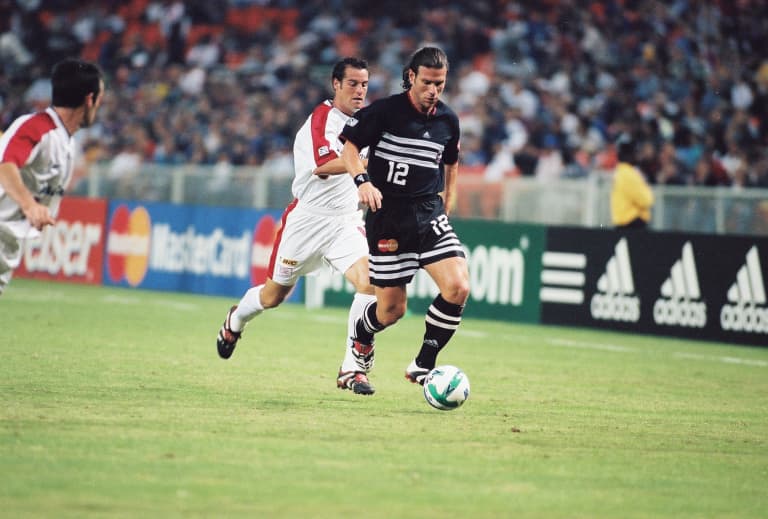
At the beginning of our conversation you explained how this was essentially a two-year season with ’98 and ’99. So when the final whistle blows, it’s 2-0, and you actually achieved the end of that two-season journey, was it almost like a sense of relief in some ways?
I think you’re right. I think there was a bit of a relief that now we finally accomplished that goal after two long years of working toward it and really moving toward a common goal. Not a lot of players can say that, not a lot of teams can say that, not a lot of coaches can say that. So it did feel like there was sort of an ability to finally exhale, finally breath and finally take stock of what the last couple years entailed.
So what was the celebration like that night? And I know there was a parade in D.C. a few days later. Was it almost like walking on air for the next 72 hours?
Yeah, it really was. There’s only one team in the league that’s going to feel like they’ve had a successful season, so it’s a unique experience. I don’t recall if we had a parade before and I’m not sure if MLS teams had a parade before. I can’t remember. But we were representing the city, we were representing a commonality amongst our group, and for those few days, everything was sweeter, everything smelled better, tasted better. Everything was better. Those things and the relationships you make along the way are the things you remember the most.
Do you find yourself still keeping in touch with your teammates all these years later?
Working in the (MLS) league office, I obviously see a lot of them from time to time. It’s great to catch up and relive old memories. It’s great to catch up with former coaches and former players, not only for D.C. but also to hear sort of the stories from when they played D.C. and what it was like. We trade war stories. Look, in the end we were all trying to push this league forward. We were all trying to make sure that we have a place to play. We were all trying to do the best we could to ensure that professional soccer here in the United States was here to stay.
Does the run with D.C. United remain one of your most enjoyable moments as a pro?
Yeah, absolutely. A lot of times you remember the things that didn’t go well or you didn’t get what you thought you wanted. In a strange way, 1998 with the FIFA World Cup and then going to 2002 (in South Korea), those were completely different stories. The ’98 to ’99 season with D.C. United were not like the World Cup experience, but it was similar in the sense that we didn’t achieve the goal that we wanted (by losing in the ’98 MLS Cup). And we felt dejected and we felt like we had to come back, so ’99 was sort of the comeback from that.
I really look back at that time with a lot of fondness, both for what we did on the field but really a lot was about the people that represented the club on the field and the people that represented the club off the field, all the work that was done behind the scenes. Again, none of us could have been successful without all the work that was done by Kevin and his staff and the front office staff. When we saw those people live and die for our team each and every day, and they were as big of fans as the people who came to RFK and cheered us on, it really meant something.
And we were one of the few teams in the league at that point that had a training facility that housed our entire team and front office staff. And I think that was incredibly important to not only the ethos of who we were, but that feeling of family, that feeling of being all together in this. Again, coming off the field and seeing different people from the front office and seeing how it impacted them and how important it was to them made it important to us. That bond, I think, was there and still is here to this day.

